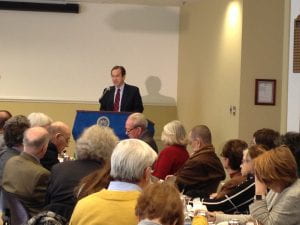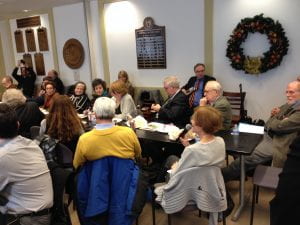WASHINGTON, D.C. – American information programs are underfunded and disorganized, and a new coordinator of all U.S. international information efforts government-wide is urgently needed.
That was the assessment and recommendation by David Ensor, Director of the Voice of America until he stepped down last year. He spoke Monday at the monthly CCLP Washington DC Communication Leadership lunch forum.
“In a world where Vladimir Putin ‘weaponizes’ information and where terrorists recruit on the Internet, the United States has no one in overall charge of its information efforts,” said Ensor in his prepared remarks.
And he elaborated on his proposal during q&a with the forum’s audience.
“Our country has white, gray and black programs in the area of information,” Ensor said. “What we don’t have is someone in overall charge of it, who thinks about how these things relate to each other. We should. This is a serious matter that should be handled at a very high level by people doing it full time.”
Ensor, whose journalism career included NPR, ABC News and CNN before his VOA appointment, said more resources are needed for information programs and for public diplomacy generally, noting the budget for information programs today is less than it was fifteen years ago.
“It is way under-resourced,” he argued. “All of it is under-resourced, including public diplomacy efforts, including broadcasting of honest journalism. . . We just aren’t taking this subject seriously enough.”
 The entire annual VOA budget is now just over $200 million, according to Ensor. By contrast, China is spending “billions” on its CCTV international television channels, nd Russia is pouring money into its RT channel. The good news, according to Ensor, is that the global audience for Russian propaganda may be much smaller than is generally realized.
The entire annual VOA budget is now just over $200 million, according to Ensor. By contrast, China is spending “billions” on its CCTV international television channels, nd Russia is pouring money into its RT channel. The good news, according to Ensor, is that the global audience for Russian propaganda may be much smaller than is generally realized.
“In the United States,” he said, “RT claims a solid audience but does not make public data from the Nielsen company or elsewhere to back that up. And a Nielsen press official told one reporter that RT’s American audience is too small to be measured.”
And Ensor said RT’s audience has dropped as its coverage became more biased.
“In the UK for example, in May 2013 when the Ukraine story broke, RT was 175th out of 278 channels, with 120,000 viewers,” he noted. “As RT’s coverage became increasingly shrill and one-sided that number dropped—to 90,000 one year later—less than two tenths of one percent of the UK viewing population.”
You can see video of Monday’s program here.
This CCLP Washington forum was part of a monthly series of lunch forums presented in partnership with the USC Center on Public Diplomacy and the Public Diplomacy Council.
Next month’s program, on Monday, February 1, will focus on the State Department’s Bureau of International Information Programs.